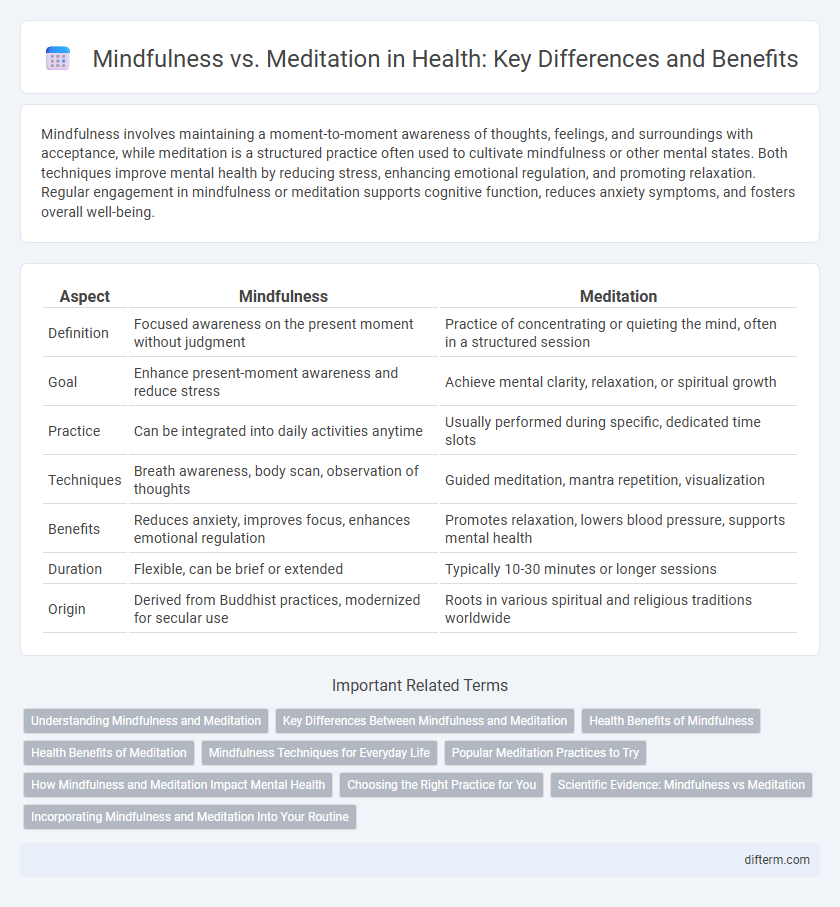Mindfulness involves maintaining a moment-to-moment awareness of thoughts, feelings, and surroundings with acceptance, while meditation is a structured practice often used to cultivate mindfulness or other mental states. Both techniques improve mental health by reducing stress, enhancing emotional regulation, and promoting relaxation. Regular engagement in mindfulness or meditation supports cognitive function, reduces anxiety symptoms, and fosters overall well-being.
Table of Comparison
| Aspect | Mindfulness | Meditation |
|---|---|---|
| Definition | Focused awareness on the present moment without judgment | Practice of concentrating or quieting the mind, often in a structured session |
| Goal | Enhance present-moment awareness and reduce stress | Achieve mental clarity, relaxation, or spiritual growth |
| Practice | Can be integrated into daily activities anytime | Usually performed during specific, dedicated time slots |
| Techniques | Breath awareness, body scan, observation of thoughts | Guided meditation, mantra repetition, visualization |
| Benefits | Reduces anxiety, improves focus, enhances emotional regulation | Promotes relaxation, lowers blood pressure, supports mental health |
| Duration | Flexible, can be brief or extended | Typically 10-30 minutes or longer sessions |
| Origin | Derived from Buddhist practices, modernized for secular use | Roots in various spiritual and religious traditions worldwide |
Understanding Mindfulness and Meditation
Mindfulness involves maintaining a moment-by-moment awareness of thoughts, feelings, bodily sensations, and the surrounding environment with an open and non-judgmental attitude. Meditation is a structured practice often used to cultivate mindfulness by focusing the mind on a specific object, thought, or activity to achieve mental clarity and emotional calmness. Understanding that mindfulness can be practiced informally throughout the day while meditation typically requires dedicated time is key to integrating both into health routines.
Key Differences Between Mindfulness and Meditation
Mindfulness is the practice of maintaining moment-to-moment awareness of thoughts, feelings, and surroundings, while meditation involves structured techniques to cultivate concentration and tranquility, often incorporating mindfulness. Key differences include mindfulness being an ongoing, informal practice applicable anytime, whereas meditation typically requires dedicated sessions and specific methods such as guided, mantra, or breathing meditation. Both improve mental health by reducing stress and enhancing emotional regulation, but meditation often yields deeper states of relaxation and mental clarity.
Health Benefits of Mindfulness
Mindfulness practice offers significant health benefits by reducing stress levels and lowering blood pressure, which can improve cardiovascular health. Consistent mindfulness enhances emotional regulation, leading to decreased symptoms of anxiety and depression. Research indicates that mindfulness strengthens the immune response and supports better sleep quality, contributing to overall well-being.
Health Benefits of Meditation
Meditation enhances mental health by reducing stress, anxiety, and symptoms of depression through deep relaxation and focused attention. Regular meditation improves cognitive function, boosts emotional resilience, and supports cardiovascular health by lowering blood pressure. Scientific studies confirm that meditation promotes neuroplasticity, increasing gray matter density in brain areas linked to learning and memory.
Mindfulness Techniques for Everyday Life
Mindfulness techniques for everyday life include focused breathing, body scan meditation, and mindful walking, all of which enhance present-moment awareness and reduce stress. Practicing these methods regularly improves emotional regulation, cognitive function, and overall mental well-being. Incorporating short mindfulness exercises during daily activities fosters resilience and promotes a balanced, healthy lifestyle.
Popular Meditation Practices to Try
Popular meditation practices to try include mindfulness meditation, which emphasizes non-judgmental awareness of the present moment and breath focus to reduce stress. Loving-kindness meditation fosters compassion by repeating positive affirmations towards oneself and others, enhancing emotional well-being. Body scan meditation increases bodily awareness by systematically focusing attention on different body parts, promoting relaxation and stress relief.
How Mindfulness and Meditation Impact Mental Health
Mindfulness enhances mental health by promoting present-moment awareness, reducing stress, and improving emotional regulation through consistent practice of non-judgmental observation. Meditation supports mental well-being by altering brain structure, increasing gray matter in areas related to attention, memory, and emotional control, leading to decreased anxiety and depression symptoms. Both mindfulness and meditation foster neuroplasticity, enabling the brain to adapt and build resilience against mental health disorders.
Choosing the Right Practice for You
Mindfulness and meditation both enhance mental clarity and reduce stress, but mindfulness emphasizes present-moment awareness in daily activities, while meditation often involves structured sessions of focused attention or relaxation. Selecting the right practice depends on individual goals, such as managing anxiety, improving concentration, or cultivating emotional balance. Tailoring techniques like mindful breathing, body scans, or guided meditation can optimize personal well-being and sustainable habit formation.
Scientific Evidence: Mindfulness vs Meditation
Scientific evidence reveals that mindfulness enhances attention regulation and reduces stress by promoting present-moment awareness, supported by neuroimaging studies showing increased activity in the prefrontal cortex. Meditation, particularly focused-attention meditation, is linked to structural changes in brain regions associated with emotional regulation and self-awareness, such as the anterior cingulate cortex and insula. Comparative analyses indicate both practices improve psychological well-being, but mindfulness demonstrates more consistent effects on cognitive flexibility and anxiety reduction across diverse populations.
Incorporating Mindfulness and Meditation Into Your Routine
Incorporating mindfulness and meditation into your daily routine enhances mental clarity, reduces stress, and promotes emotional well-being. Practicing mindfulness involves maintaining present-moment awareness during everyday activities, while meditation typically includes focused breathing or guided techniques to deepen relaxation. Consistent application of both methods strengthens cognitive function and supports long-term mental health.
Mindfulness vs meditation Infographic

 difterm.com
difterm.com